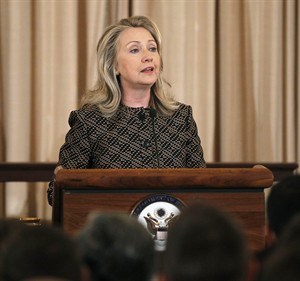
Secretary of State Hillary Rodham Clinton speaks at the 2012 World Food Prize laureate announcement ceremony, Tuesday, June 12, 2012, at the State Department in Washington. (AP Photo/Pablo Martinez Monsivais)
June 13, 2012 - 2:18 AM
WASHINGTON - The United States is holding high-level talks on Wednesday aimed at boosting relations with India, a critical partner for U.S. interests in Asia. But even as one obstacle to closer relations has been lifted, others stand in the way.
The threat of U.S. sanctions against India for its large yet declining oil imports from Iran was lifted two days before Secretary of State Hillary Rodham Clinton's meeting with India's foreign minister, S.M. Krishna, for an annual strategic dialogue in Washington.
But differences remain, particularly over India's reluctance to undertake economic reforms. Despite the fast growth in trade between the two countries, barriers to investment still frustrate U.S. companies.
President Barack Obama visited India in late 2010 and declared that the U.S.-India relationship would be a defining partnership of the 21st century. Both nations are concerned about managing China's rise, and security co-operation and defence sales have grown rapidly. Washington looks to New Delhi as a partner in the economic development of Afghanistan and wants India to play a more active role in training Afghan security forces as the U.S. and its NATO allies plan to withdraw combat forces by 2014.
Defence Secretary Leon Panetta visited India earlier this month, and Treasury Secretary Timothy Geithner will become the fifth Cabinet-level U.S. official to do so this year when he travels there at the end of June.
"Our ties have never been stronger," Clinton said Tuesday. "We are working together like never before to build an open, free, transparent and fair economic system, to promote peace and prosperity in South Asia and the Asia-Pacific, to co-ordinate international responses to violent extremism and so much more."
This week's dialogue attests to the breadth of U.S.-India co-operation, including on education, energy and climate change, science and technology, and health.
Growth in the partnership contrasts with deteriorating U.S. relations with India's neighbour and rival Pakistan, which eyes the deepening ties with suspicion.
But India also has struggled to deliver on the kinds of economic reforms that Washington wants, changes that would provide more opportunities for U.S. businesses. In November, Prime Minister Manmohan Singh's government backtracked on plans to allow foreign investment by such companies as Wal-Mart in its supermarket — or "multibrand" — retail sector after it ran into domestic opposition.
Tim Roemer, who served as U.S. ambassador to India between 2009-2011, wrote in an opinion piece in The Washington Post last week that despite rising trade in goods and services — predicted to reach $100 billion this year, up fivefold from a decade ago — "too many U.S. firms still find obstacles to doing business in India."
He complained that a 2008 civilian nuclear agreement has been altered so radically by India's parliament that U.S. businesses may be frozen out of the market. The agreement, introduced by President George W. Bush's administration, allowed India access to technology from international suppliers it had been denied since it conducted its first nuclear test explosion in 1974. Roemer also wrote that U.S. businesses are discouraged from competing for lucrative infrastructure projects.
Karl Inderfurth, a South Asia expert at the Center for Strategic and International Studies think-tank in Washington, said the U.S.-India talks could boost investor confidence if the two governments make a concrete commitment to completing a bilateral investment treaty.
As well as economic ties, Inderfurth expected the U.S. and India to discuss a raft of international issues, including support of democratic reforms in Myanmar and the future of Afghanistan. He said India will be looking for reassurance that the U.S. will retain a substantial presence in Afghanistan beyond 2014 because of concerns for that country's stability as Western forces withdraw after a decade of fighting al-Qaida and the Taliban.
News from © The Associated Press, 2012